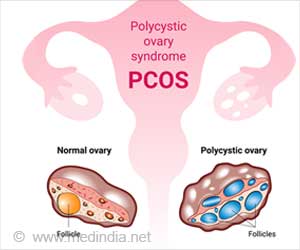Polycystic ovarian syndrome (PCOS) leading to various skin problems, can be managed with medical treatments, lifestyle changes, and a skincare routine.

‘Start managing the signs of PCOS on your skin such as stubborn acne and sudden inflammation with a proper skincare routine and diet plan with a help of a dermatologist.’





The main symptoms include irregular periods, weight gain, excess facial hair, and skin problems that can be quite frustrating to deal with. Therefore, it is important to know what to keep in mind as you fight PCOS for improved skin.Symptoms of detecting PCOS?
The transitioning of skin during PCOS could also be an early sign to detect it. Cysts and nodules are more commonly seen along the jawline and on the chin.Moreover, acne tends to flare up before menstruation and one may suddenly develop coarse thick hair on the face, breasts, and chest. One may also develop thick velvety patches on the neck, underarms, and groin.
The increased inflammation in the skin due to hormonal imbalance and insulin resistance in PCOS could lead to aggressive acne on the lower part of the face. These acnes are deeper seated, take longer to resolve, and often leave deep scars.
Building An Ideal PCOS Skincare Routine If you are suffering from PCOS, the effects on your skin could be an indication and you can simply start by setting your skincare routine right, followed by consulting your dermatologist for professional treatment.
The morning routine will consist of a salicylic acid-based cleanser followed by an alcohol-free toner, water-based or gel-based moisturizer, and finally, water-based or gel-based sunscreen. For the nighttime, it is best to avoid oil-based products and instead go for the ones which are ideal for the treatment.
At bedtime, the makeup should be removed with cleansing lotion and not oil, avoid using oil. Follow it up with the cleanser and use the anti-acne cream and the moisturizer over it.
Advertisement
Diet is also important for skin health. In the case of PCOS, include more veggies, high-fiber unprocessed grains with a low glycemic index (such as oats and quinoa), oily fish, avocados, nuts, and seeds. Eliminate dairy foods if you are allergic to lactose.
Things to Avoid in PCOS Skincare Routine
The skin might be going through tremendous changes as you switch the skincare routine, so it is better to avoid a few things during this time.Advertisement
Furthermore, avoid any kind of facials, using too many products on the face, and do not apply anything without a dermatologist’s recommendation. You should also stay away from fried and oily foods since they might cause excessive sebum production and oily skin.
Source-Medindia















